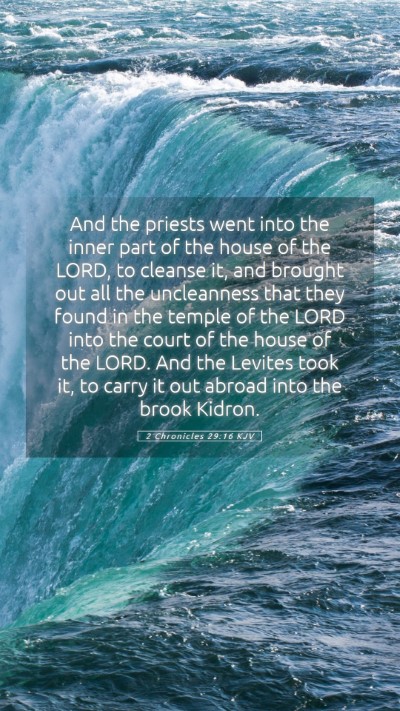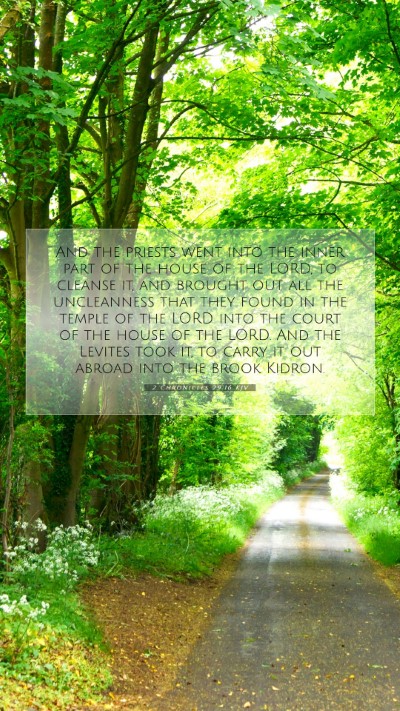Bible Verse Commentary on 2 Chronicles 29:16
Verse: 2 Chronicles 29:16 - "And the priests went into the inner part of the house of the LORD to cleanse it, and brought out all the debris that they found in the temple of the LORD to the court of the house of the LORD. And the Levites took it to carry it outside to the brook Kidron."
Meaning and Interpretation
The account found in 2 Chronicles 29:16 offers a profound insight into the restoration of worship and purification within the Temple, stemming from King Hezekiah's reign and his significant religious reforms.
Historical Context
In order to understand this verse's implications, we must consider the historical context of Hezekiah's actions. Prior to his reign, Judah had experienced periods of idolatry and neglect of the Temple, leading to spiritual decay among the people. The clearing of the Temple as recounted here signifies a decisive return to God and proper worship.
Insights from Commentaries
- Matthew Henry: Henry emphasizes the importance of purification in worship. He observes that the work of cleansing the Temple was essential for the revival of true worship, signaling that anything unclean or idolatrous must be removed.
- Albert Barnes: Barnes highlights the cooperative effort of the priests and Levites, underlining the theme of collective accountability in worship practices. He notes how this distribution of tasks among the clergy reflects the orderly approach required in approaching holiness.
- Adam Clarke: Clarke provides insights into the symbolic meaning of the debris that was removed. He suggests that this debris represents not just physical dirt but the spiritual defilements that had accumulated over time due to neglect and apostasy.
Spiritual Implications
This verse serves as a metaphor for personal purification. Just as the priests cleared out the Temple to make it a suitable place for God's presence, believers today are called to examine their hearts and lives, removing anything that hinders their relationship with God. This represents a call to reflect on one's spiritual state and to seek reformation in worship.
Application of the Verse
The diligent efforts of the priests and Levites reflect principles applicable to modern worshipers:
- Taking Responsibility: Just as the priests were accountable for the Temple, individuals today must take responsibility for their spiritual lives and communities.
- Prioritizing Purity: This verse encourages us to confront and cleanse any impurities in our lives that may impede spiritual growth.
- Community Involvement: The shared work among the Levites highlights the importance of community in spiritual health, echoing the role of Bible study groups and communal worship.
Cross References
- 2 Kings 18:4 - Details about Hezekiah’s reforms, including the removal of idols.
- Ezra 6:14 - Refers to the rebuilding of the temple and restoration of worship after exile.
- Isaiah 1:16-17 - A call to wash and make oneself clean in preparation for worship.
Conclusion
In summary, 2 Chronicles 29:16 is a foundational verse that illustrates the need for purity and dedication in worship. Insights drawn from public domain commentaries reveal its significance within Scripture analysis and biblical exegesis. As one studies this verse, it becomes clear that understanding Scripture not only involves intellectual engagement but also a practical application of its truths to daily life.
Further Study
For those seeking deeper Bible study insights, it is beneficial to engage in:
- Online Bible study resources
- Bible study guides focusing on Old Testament worship
- Discussion in Bible study groups about the implications of Temple worship today


